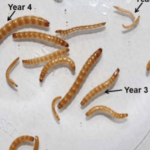Autoimmune diseases, which affect 4% of the population worldwide, mistakenly attack healthy cells, tissues, and organs in the body.
Researchers from Peter Gawler’s Department of Immunobiology at King’s College London (KCL) have identified a key feature of autoimmune diseases in the gut, where bacteria normally meet the immune system.
This study reveals that the hallmarks of autoimmune disease in the gut are normal components of the immune system interacting with each other, along with bacteria.
Autoimmune diseases, which affect about 4% of the world’s population, occur when the body’s immune system mistakenly attacks healthy cells, tissues, and organs in the body.
There are more than 80 different types, and some of the most common autoimmune diseases include type 1 diabetes, multiple sclerosis, rheumatoid arthritis, lupus, Crohn’s disease, psoriasis, and scleroderma.
Researchers combined spatial transcriptomics and multiplexed single-cell techniques to precisely identify B-cell subtypes in normal intestinal lymphoid tissue from lupus patients.
Lupus, which affects approximately 5 million people worldwide, is a chronic autoimmune disease that causes inflammation that leads to permanent tissue damage.
DN2 B cells were found to interact with dendritic cells in the intestine and co-express the lupus autoantigens DNASE1L3 and C1q along with bacteria.
DN2 B cells, DNASE1L3, and C1q in the intestine are said to be involved in bacterial recognition, bacterial killing, and processing of bacterial debris, including DNA, and are said to be involved in bacterial recognition, bacterial killing, and processing of bacterial debris, including DNA, when the system becomes dysfunctional. DNA may remain and stimulate an autoimmune response.
Joe Spencer, Professor of Experimental Medicine in the Peter Gawler Department of Immunobiology in the KCL School of Immunobiology and Microbial Sciences, said: “This unexpected result provides insight into how the intestinal immune system interacts with the vast array of gut microbiota. It helped me understand.”
Researchers believe their findings may help prevent certain autoimmune diseases.
Most recently, researchers at Johns Hopkins University School of Medicine revealed Certain combinations of antiviral proteins have been shown to cause symptoms and influence treatment outcomes for lupus patients.
Research published in cell report medicine This could change the way clinicians treat patients with this disease.







